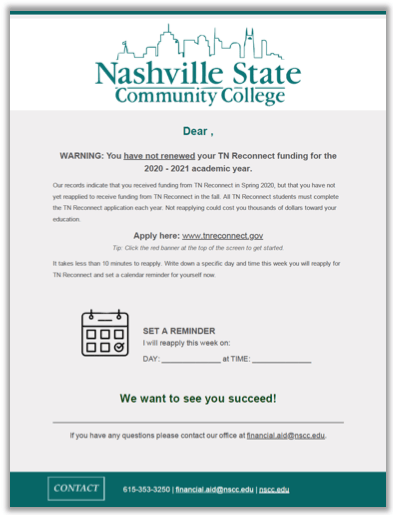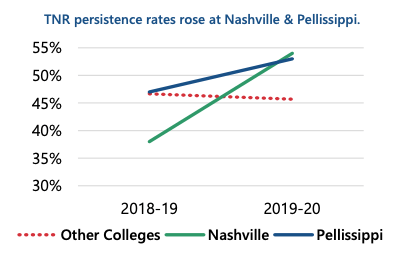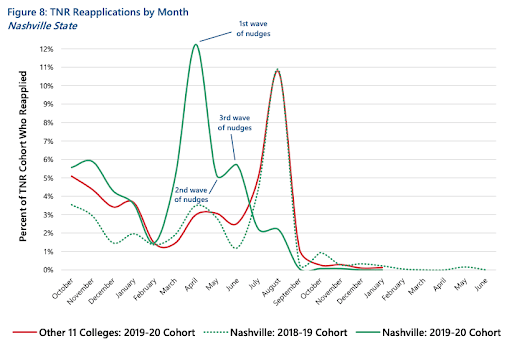This is part of a series of posts about our ongoing partnership with the University of Virginia’s Nudge4 Solutions Lab and the community college systems of Tennessee and Virginia to increase degree attainment among adult students in the U.S. by designing and testing behaviorally informed solutions. Click here to read more about this partnership.
In Tennessee, more than half a million working-age adults, or one in six Tennesseans between the ages of 25 and 64, have attended college but not completed a postsecondary degree. Given that adults with some college credits but no degree face significantly worse employment outcomes than those with a degree, many states have started to prioritize increasing degree attainment among this population.
In 2018, Tennessee launched Tennessee Reconnect, a “last dollar” scholarship that offers adults without a postsecondary degree the opportunity to attend a community college tuition-free. After its launch, adult student enrollment at Tennessee community colleges increased for the first time since 2010. However, fewer than half of these students reapplied for Tennessee Reconnect (a requirement for maintaining the scholarship) and returned the following year.
ideas42 and the Nudge4 Solutions Lab collaborated with the Tennessee Board of Regents (TBR) to boost the persistence of Reconnect students.
We started by conducting interviews with 30 students from two community colleges in Tennessee—Nashville State Community College and Pellissippi State Community College—to better understand the behavioral barriers that prevent Reconnect students from reapplying for the scholarship and persisting to the following academic year. From these interviews, we identified three primary barriers:
- Lack of Awareness: Students often don’t know that they need to reapply for Reconnect each year.
- Limited Reminders: Many students either don’t receive a reminder to reapply, or don’t receive a reminder that effectively captures their attention and prompts them to act.
- Unclear Information: Students don’t know who to go to with questions about Reconnect, or they may receive inconsistent information depending on who they ask.
Based on these insights, we designed a set of interventions to increase reapplication and persistence rates among Reconnect students at Nashville and Pellissippi. The first of these interventions, piloted in spring 2020, consisted of nudging students to reapply for the Reconnect scholarship through a series of reminders—targeted emails, texts, and alerts posted on the schools’ online portals and learning management systems. Nudges sent to Reconnect students, like the email below, highlighted the need to reapply for the scholarship each year, prompted action by specifying where to apply and how long it would take, and specified who to contact for help.

An example email nudge urging students to reapply for the Reconnect scholarship.
The reminders increased reapplication and persistence rates for Reconnect students at Nashville and Pellissippi. At Nashville, persistence rates for Reconnect students increased from 38% in 2019 to 53% in 2020; at Pellissippi, persistence rates rose from 47% to 53%. In contrast, persistence rates during the same time period at the other 11 community colleges in Tennessee fell from 47% to 46%.

Reapplication and persistence rates for Reconnect students at
Nashville, Pellissippi, and other Tenessee Community Colleges.
Surges in Reconnect reapplication rates immediately following the emails, texts, and alerts indicate that these nudges were effective.

Reapplications for Reconnect by month at Nashville and other Tenessee Community Colleges.
Not only were these interventions effective, but they were inexpensive to implement; all reminder emails, texts, and alerts were sent through existing communication systems. For a full summary of the results and implementation details, read our report.
The success of reminder interventions in Tennessee community colleges is just one of many aspects of our partnership targeting college success. In the coming months, we’ll share results from additional interventions we’ve piloted. If you’re interested in learning more, or asking questions of our team, register for our (free) September webinar on improving adult student success and persistence. This work and other interventions like it, if scaled to more college systems, holds promise for improving the long-term economic security and well-being of millions of adults across the country.



